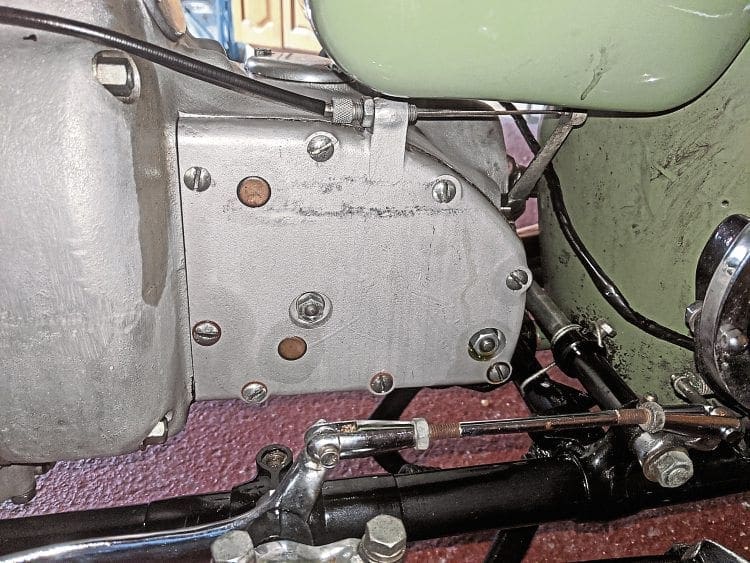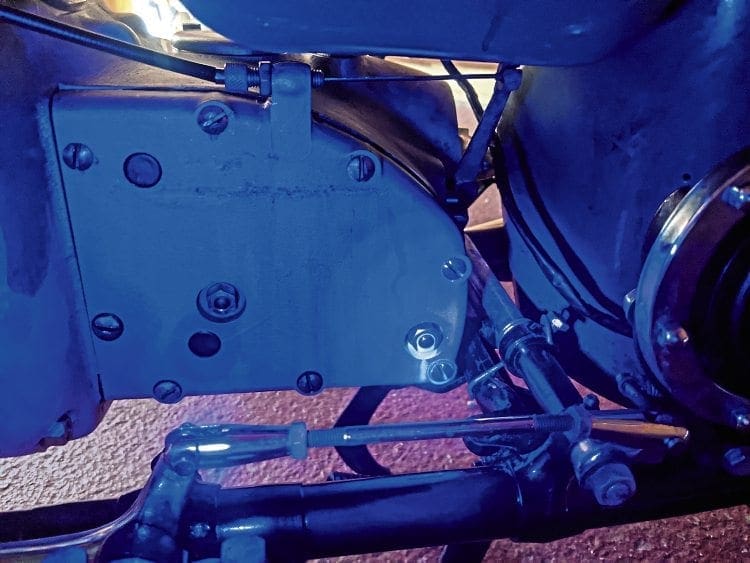I am probably the last person in the world to find out about this but, just in case there is one other person that is struggling, here is something I have recently found out regarding the chasing of the source of oil leaks and using UV lights and UV dye to find it.
I have been chasing oil leaks on a Sunbeam S7 bike for many years. The problem is identifying the source of the leak, as after a few miles of riding, the oil is spread across the engine. Running the bike ‘static’ doesn’t help, as it’s so hard to see where the oil trail begins.
Enjoy more Old Bike Mart reading every month.
Click here to subscribe & save.
But no more…
The answer is to use a UV (ultra violet) torch, and possibly a UV oil dye.
I didn’t realise that oil will naturally ‘fluoresce’ (i.e. be luminous) under UV light. So, if you clean up an engine as much as possible (then run it), and then shine a UV torch onto the engine, it will show up the trail of the oil.
Of course, if the oil leak is very slow, or is a very small leak, you may want to improve the chance of finding it, to this end, you can add a UV dye to the oil, and try again. This UV dye is really ‘bright’ under UV light, and very easy to spot.

Clearly, you need to be in a dark place when you do the test, as the fluorescence effect is easier to spot.
Also be aware that (I think) any oil product will fluoresce, including petrol, so whatever leak you are chasing will show up as a glow. Apparently different oil products fluoresce as slightly different colours; personally, as long as they glow in the dark, I don’t care.
Note: After cleaning up the engine, and before you do the first test (and before you add any dye) try shining the torch on the engine, it will give you the ‘before’ image so you can see where there is old oil present, and then it’s easier to see what changes when you run it.
If you use the dye, it suggests running the engine for 20 minutes to mix in the dye (as in driving, I believe). Trouble is, oil can get a long way in 20 minutes…
So, I think it’s better to mix the dye with some oil (to aid mixing), and then do a static test (stationary, in the garage, or a darkish place) for a few minutes to start with, then do the torch test, then repeat, doubling the time each time, until you can see where it’s coming from.
The products I used are:
UV Torch: LemonBest Bright 395 nm 51 UV LED Flashlight Black Light (Amazon)

Dye: Ring RLD4 (again Amazon) at present, only available as a ‘kit’ with a small UV torch included, for a couple of extra quid. The torch works, but is very low-powered – you are way better off using something that is more powerful.
Note: I am not paid by anyone for recommending these products, and there may be many fine alternatives available, I’m just telling you what I have used, and where I got them from.
Happy oil leak hunting!
Peter Grieves
Read more Letters, Opinion, News and Features at www.oldbikemart.co.uk and in the October 2020 issue of Old Bike Mart – on sale now!




